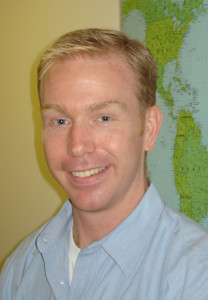If an act of terrorism struck in your city would you be prepared? According to the findings in an article co-authored by Kevin Keenan, assistant professor in the Department of Political Science and urban studies and geography programs, if you talk with social contacts about terrorism, you are more rational and prepared if a terrorist event were to occur. In addition, it is the people you surround your self with (your social contacts) and how you talk about terrorism with your social contacts that affects/shapes your awareness of vulnerability to terrorism.
Professor Kevin Keenan, Department of Political Science
“Drawing on data from 93 interviews with householders in Boston, the study demonstrates that: (1) family networks generated discussions of home preparedness, whereas workplace networks engaged a wider variety of topics; (2) women discussed terrorism more frequently and in greater depth than did men; and (3) women heard more preparedness messages for the home than did men, whereas men undertook preparedness activities external to the home. The findings bridge geography and terrorism studies by theorizing emplaced and subjective human experiences that prompt conversations about terrorism. These conversations, in turn, help urban emergency managers and risk-hazards geographers promote rational dialogue and action vis-à-vis terrorism. Hazards researchers have shown that the more people discuss terrorism, the less they seek extreme and unwarranted responses.”
The article, “Gender, Place, and Social Contacts: Understanding Awareness of Vulnerability to Terrorism”, is co-authored with Susan Hanson at Clark University and has been accepted for publication in the journal Urban Geography and will be out soon. So, stay tuned!
